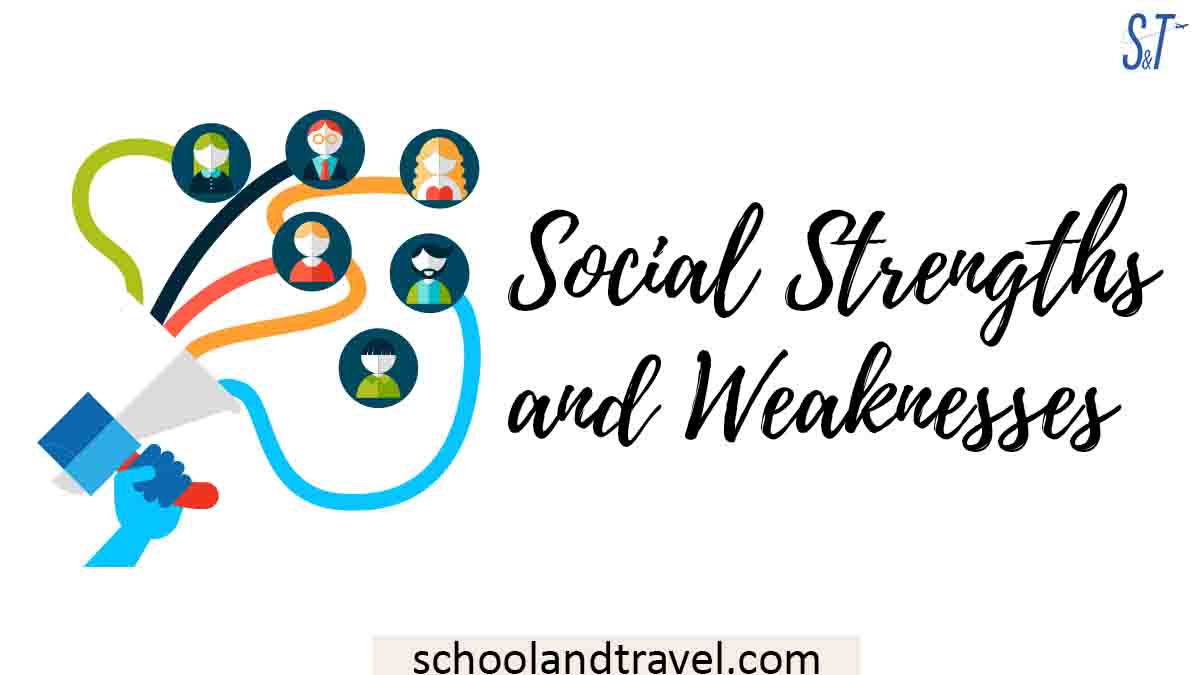“What are the main social strengths that everyone needs to do well in college, and how do I identify them?”
This is a question we get to ask ourselves once we get into college to help us cope with new people from different fields of life with unique characters and communication skills.
The strengths and weaknesses listed in this article will help you observe yourself and know how to improve your strengths.
What are Social Strengths?
Social Strengths are unique skills that help students scale through social situations and conditions.
Some of these strengths are inherent and sometimes unnoticed by the students until they are taught how to identify these social strengths.
The amazing thing about these skills is that they help peer-to-peer communication and create a proper understanding of one another during communication.
Although there are different ways to build relationships or connect with people, most of these strengths are the basic skills you need to help create a good impression and help foster communication.
Examples of Social Strengths:
There are hundreds of skills you can use to build up your social life, but here are the primary five skills that will go a long way:
1. Active Silence:
This has to do with listening carefully to a peer during communication. The silence here entails allowing your partner to complete whatever they say without interruption.
Active silence requires a good attention span, as you must respond adequately after your partner has completed his end of the communication.
2. Win-win thinking:
Win-win thinking is a major factor in building social strengths because, in this context, you don’t strive to be the champion but to see that you understand your partner from their point of view.
This type of thinking is helpful in studies such that you’ll help your mates in their academic pursuits if you are more knowledgeable than they are in a specific topic of interest.
3. Language:
The lack of proper use of Language can be a social weakness for students trying to understand a teacher.
Let’s assume I get into your class as a teacher to teach Spanish, and I teach Spanish as though everyone understands the language;
I’m sure you won’t be comfortable in the class as much as you prefer a teacher who would start from scratch since you have no idea of Spanish.
Language in another context could be using obscure words that would sound unpleasant to the ear of someone listening to you. So, to build your social strength, you must be cautious of how you use your words.
Read this: Underrated Parts of School You Should Focus on
4. Eye Contact:
Making eye contact as a student during communication will go a long way in helping your partner or the speaker know that you are interested and confident in what they are saying.
On the other hand, eye contact has to be maintained for about 50% of the time spent while communicating, and in the case of being an active listener, you can maintain eye contact for about 70% of the speaking time.
You could hold eye contact for about 4-5 seconds and then glance elsewhere and continue the eye contact.
5. Networking:
Your network is your net worth; thus, you need to network and learn how to communicate effectively with people (Interpersonal learners) to build social skills.
Networking skills are important to help you build strong relationships and connect with people from diverse fields of life.
Networking is also an important interpersonal skill that will help you make better decisions and get support from different fields of life.
You can build your social strengths and weaknesses through networking by:
- Asking constructive questions.
- Giving a compliment.
- Being Yourself
- Being willing to learn and understand.
- Sharing contact addresses.
- Asking Constructive Questions: Seek helpful insights, show interest in others, and promote positive discussions, enhancing communication skills and relationships.
- Giving a Compliment: Boost others’ confidence, spread positivity, and strengthen connections by expressing genuine appreciation for their qualities and actions.
- Being Yourself: Embrace authenticity, stay true to your values, and cultivate genuine connections, fostering trust and meaningful relationships with others.
- Being Willing to Learn and Understand: Stay open-minded, seek knowledge, and empathize with diverse perspectives, improving personal growth and enhancing relationship dynamics.
- Sharing Contact Addresses: Exchange communication details to stay connected, facilitate collaboration, nurture relationships, and build a strong and supportive social network.
How to identify Social Strengths and Weaknesses:
Identifying your strengths and weaknesses helps improve your social life and life. You can use the following steps to identify your strengths and weaknesses:
1. Evaluate yourself sincerely:
Like identifying your academic strengths, you must evaluate yourself to know where you lag.
You know yourself more than everyone else; thus, asking yourself questions about why you are not social enough will go a long way in helping out.
Read this: Intrapersonal learner (Major tips about this learning style)
2. Talk to someone you trust:
I know you’ve got friends who can help you analyze your social and communication skills and tell you where you lag.
These friends should be people who are close to you and understand how you communicate with them.
However, just like identifying your academic strengths, choose people who have spent ample time with you and have observed your abilities when seeking an opinion.
They should be honest, trustworthy, and unbiased. They could be your parents, friends, teachers, professors, or school counselors.
How to work on your Social Weaknesses:
1. Give it time:
Time is a primary factor in the development of a social lifestyle. You must give your friends and fellow students time to develop good communication skills and work on your weaknesses.
2. Don’t be too afraid to change:
“Change they say is Constant”; thus, to develop new social strength, you must be open to change in how you communicate with people around you.
Be free; understand that the only person who can bring you out of the shell of timidity is you and you alone.
What are the Social Strengths of Students in College?
The social strengths of students in college include:
- Communication and comprehension skills (Public Speaking)
- Leadership
- Independence in class
- Self-confidence
- Responsibility
1. Communication and Comprehension Skills (Public Speaking):
Effective communication conveys thoughts, ideas, or information clearly and confidently to an audience.
This encompasses both verbal and non-verbal means of communication.
Comprehension ensures that a student not only receives information but also understands and can interpret it.
Public speaking, a subset of communication, is crucial in college for presentations, group projects, and class participation.
Good communication and comprehension skills facilitate better group dynamics, enhance learning, and prepare students for future professional endeavors where such skills are imperative.
2. Leadership:
Leadership involves guiding, motivating, and supporting peers toward achieving a shared goal or vision.
It’s not just about holding positions of authority but also about being a role model and making decisions that benefit the larger group.
Leadership skills help students take charge of group projects, student organizations, or community initiatives.
It fosters teamwork and is highly valued in post-college professional settings. Demonstrated leadership in college can also open doors to unique opportunities and networks.
3. Independence in Class:
This refers to a student’s ability to work autonomously, actively engage with the course material without constant external motivation, and take the initiative in their learning process.
College professors often expect students to be proactive. An independent student is likely to seek resources, ask questions, and dive deeper into topics of interest.
This autonomy ensures that learning is self-driven, making it more meaningful and long-lasting.
4. Self-confidence:
Self-confidence is the belief in one’s abilities and judgments. It enables students to approach challenges with optimism and resilience, trusting their capabilities.
In the diverse environment of a college, students face new situations, ideas, and challenges.
Self-confidence allows them to embrace these experiences, voice their opinions, and stand up for their beliefs. It also plays a role in reducing fear of failure and promoting personal growth.
5. Responsibility:
Responsibility entails acknowledging and taking charge of one’s actions, behaviors, and duties. It’s about being dependable and making choices that reflect commitment to one’s obligations.
College life is often a student’s first taste of freedom away from parental supervision.
Being responsible ensures they manage their academic workload, respect deadlines, and balance academic and social life. It also helps in building trust with peers and professors.
Benefits of Building Social Strengths:
To some extent, a student’s social life plays a major role in building that student’s academic strengths.
If a student is social, it will create exposure and cooperation between that student and other students. Here are some of the benefits of building up a social life:
1. Better friendships:
You will discover that people with good social skills tend to have many friends who want to listen and ask questions.
This is because these people can use words to communicate ideas, and as much they get to learn from others.
2. Academic Success:
Having proficient public speaking and communication skills will go a long way in helping you perform excellently in academics.
Also, in the context of group work, which requires leadership capacities, your social strengths will go a long in helping people nominate you to be their voice and spokesperson.
5 Major Social Strengths/Skills Of A Child
1. Listening
Listening attentively and understanding what is being said is essential for effective communication.
If your kid is giving you a story, try not to cut him off in the middle of it. Listen carefully to what he has to say without trying to multitask.
This includes putting down the newspaper and avoiding other conversations. When he wants to explain something or demonstrate something, look at him.
One of the most important aspects of effective communication is listening carefully to the other person and giving them a direct answer to their comments or inquiries.
2. Collaborating And Cooperating
Children quickly learn that effective communication is crucial to the success of group projects that need them to collaborate with others.
As has been demonstrated, students’ confidence and self-esteem also increase through collaborative learning.
Learning is enhanced through demonstrating the topic in group projects, which also helps develop students’ social and interpersonal skills.
3. Patience
When something takes longer than expected, patients wait for it without getting irritated.
Being patient requires realizing that something may take more time than you anticipated.
You’ll be better positioned to envision and pursue your far-off ambitions. Now, you can think clearly and make sensible choices. You become more steadfast and sturdy.
The process of acquiring new abilities is simplified for you.
4. Respecting Boundaries
A boundary is a dividing line between what belongs to me and what doesn’t, between their perspective and mine.
Setting firm limits means acknowledging that I don’t have to share another person’s beliefs, emotions, words, or actions.
Without rules and limits, children get disoriented and rebel. What they require are rules that are unambiguous and consistent punishments.
On the other hand, they must be delivered with compassion and care.
Children better grasp the necessity of rule-following when adults explain the reasoning behind the rules and the consequences imposed for rule-breaking.
5. Sharing
Children must practice sharing to develop social skills, such as making and retaining friends, playing well with others, taking turns, negotiating, and dealing with setbacks.
Children learn the value of cooperation and fairness via the act of sharing. They pick up on the idea that if they share with others, they will be rewarded with something of equal or greater value.
Teaching your kids to share is a great way to equip them emotionally.
To teach your child that they are not the center of the world, encourage them to participate in group activities and share what they have.
By doing so, they gain an appreciation for the fact that other people have goals and needs. Your child can gain empathy and trust for others through exposure to this idea.
Frequently Asked Questions on Social Strengths and Weaknesses
Your child’s interactions with themselves and others are at the heart of their behavioral strengths. With open and honest communication about expectations, norms, and boundaries, you and other family members may help to encourage good behavior in your child.
Your personal strengths are the things you perform well and are good at. Our abilities are constantly judged in relation to those of others. Characteristics such as openness and generosity fall into this category. Personal characteristics can also be professional strengths, such as a strong work ethic and the ability to pick up new skills quickly.
The term “strength” is used to describe favorable qualities and abilities. To name only a few examples of strengths: information, characteristics, abilities, and talents. As opposed to strengths, weaknesses are characterized by the exact opposite. Weaknesses are aspects of an individual’s personality or skill set that are seen negatively or not as well developed.
The greatest leaders are those who treat their teams with the utmost regard.
Conclusion
Building social strengths and weaknesses requires you to work hard on yourself. It requires that you admit mistakes and also learn how to react to people when frustrated.
With the tips provided in this article, you can build up your social strengths, which will go a long way in helping your academic strengths get better to a large extent.
Awesome one; I hope this article answers your question.
Editor’s Recommendations:
- Is Biomedical Engineering Hard? (FAQs)
- Is Computer Engineering Hard? (FAQs)
- Is Civil Engineering Hard? (FAQs)
- Is Dental School Harder Than Medical School? (FAQs)
- Top 10+ Hardest & Easiest PhDs to get (FAQs)
- Is Accounting hard? (Meaning, Duration, Benefits, Tips, Quick Answer)





